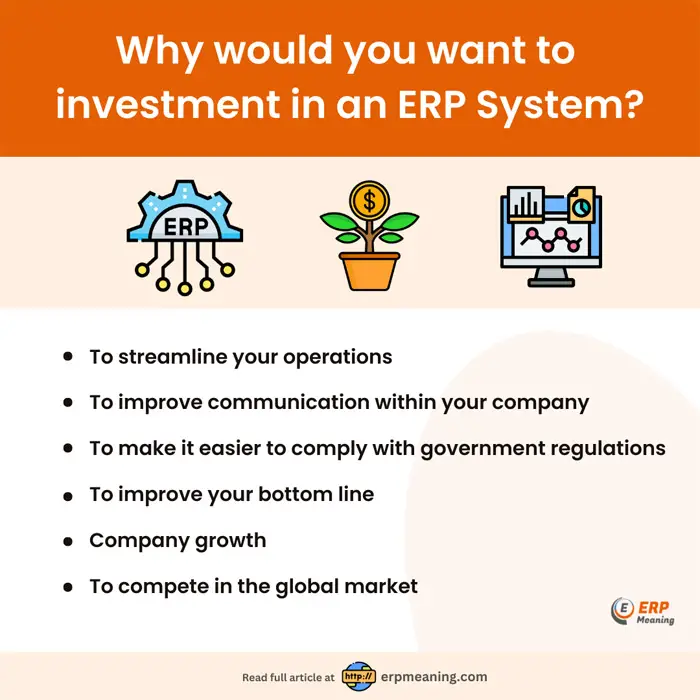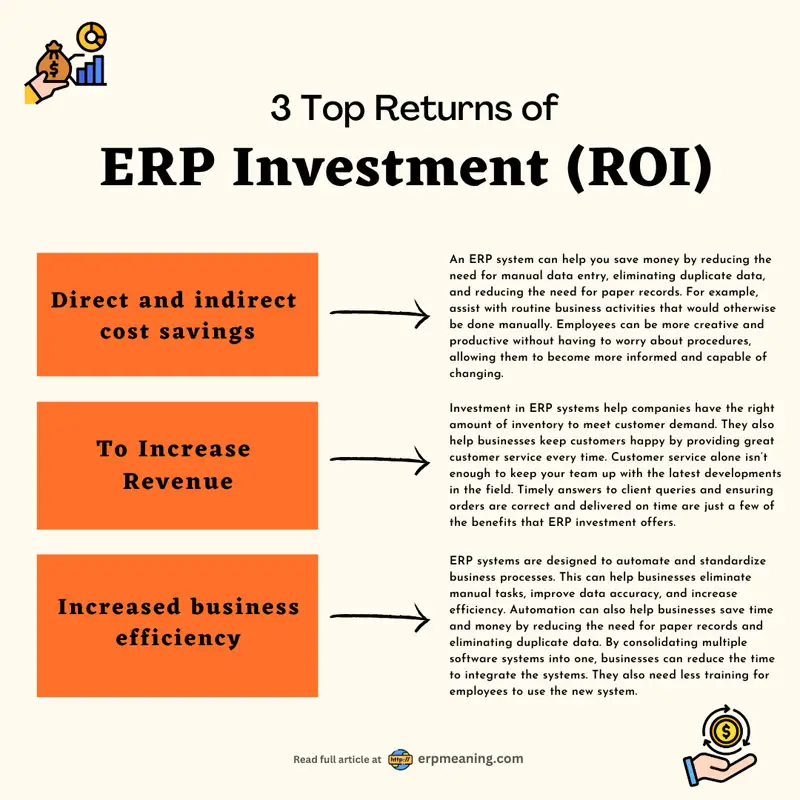Like other business owners, you are always searching for methods to increase your earnings. One of the best ways to do this is by investing in an ERP system. ERP systems can help you streamline your operations, improve communication within your company, and make it easier to comply with government regulations. We’ll go through the top ERP Return on Investment (ROI) and reasons for investment. We’ll also give pointers on picking ERP software and making a business case for investment. So, if you’re ready to advance your company to the next level, keep reading!

What is ERP System?
ERP stands for Enterprise Resource Planning. It is a software system that helps businesses manage their core operations, including financials, manufacturing, human resources, and supply chain. ERP systems are designed to give businesses a real-time view of their operations and help them make better decisions.
A common database is used to power enterprise resource planning (ERP) systems. This begins with a shared data repository that contains essential data for key activities such as accounting and finance, inventory and manufacturing, order processing, and personnel administration. ERP systems build on this shared information to develop a wide range of modules for automating and integrating operations, tracking and analyzing them, and making faster, smarter decisions. Investment in ERP systems helps businesses to improve communication and collaboration among employees, customers, and suppliers.
Why is ERP Investment Needed?
There are many reasons why you might want to investment in an ERP system. Here are some of the top reasons:
- To streamline your operations: An ERP system can help you streamline your operations by automating tasks and providing you with real-time data. This can help you improve your efficiency and save time and money.
- To improve communication within your company: An ERP system can help you improve communication by providing a central repository for all your data. This can make it easier for employees to access information and stay up-to-date on company news.
- To make it easier to comply with government regulations: An ERP system can help you comply with government regulations by providing you with the tools you need to track your data. This can help you avoid fines and penalties.
- To improve your bottom line: An ERP system can help you improve your bottom line by reducing costs and increasing efficiency.
- Company growth: An ERP system can help you manage your growth by providing you with the tools you need to track your data and improve your operations.
- To compete in the global market: An ERP system can give you a competitive edge in the global market by providing you with the ability to scale your operations.

3 Top ERP Return on Investment
There are many ERP returns on investment. Here are some of the top benefits:
1. Direct and indirect cost savings:
An ERP system can help you save money by reducing the need for manual data entry, eliminating duplicate data, and reducing the need for paper records.
They can, for example, assist with routine business activities that would otherwise be done manually. Employees can be more creative and productive without having to worry about procedures, allowing them to become more informed and capable of changing.
They can assist boost quality and cut waste by maintaining consistent, repeatable procedures. By using multiple software systems, companies can save money on licensing and on the time it takes to integrate the systems. They also need less training for employees to use the new system.
Choosing a cloud-based software-as-a-service (SaaS) ERP system, in cloud ERP the service provider is responsible for infrastructure, performance, uptime, and upgrades, further lowering IT responsibilities. ERP investment also offers opportunities for cost reduction through process improvements and economies of scale.
2. To Increase Revenue:
Investment ERP systems help companies have the right amount of inventory to meet customer demand. They also help businesses keep customers happy by providing great customer service every time. Customer service alone isn’t enough to keep your team up with the latest developments in the field. Timely answers to client queries and ensuring orders are correct and delivered on time are just a few of the benefits that ERP investment offers. Customers may also purchase from you whenever they’re ready through self-service options.
ERP software is used to keep track of money. This system makes it simple to see which items generate the most revenue and how to improve cash flow. Businesses can also use technology to determine what consumers will want in the future.
3. Increased business efficiency:
ERP systems are designed to automate and standardize business processes. This can help businesses eliminate manual tasks, improve data accuracy, and increase efficiency. Automation can also help businesses save time and money by reducing the need for paper records and eliminating duplicate data.
By consolidating multiple software systems into one, businesses can reduce the time to integrate the systems. They also need less training for employees to use the new system.
ERP investment also offers opportunities for cost reduction through process improvements and economies of scale. ERP systems can help businesses improve their bottom line by reducing costs and increasing efficiency.
Common Features of Investment in ERP
Many ERP systems are modular. This means starting with basic features and adding more features as needed or desired. Or, you can choose parts of the system relevant to your industry or company.
Most ERP systems have tools and functions for accounting, financial planning, procurement and supply chain management, production management, customer relationship management, ordering, and fulfillment. Some more complex solutions include eCommerce, professional services automation, and human resources management. These solutions can offer analytics and business intelligence, workflow integration and automation, and dashboards that give executives easier access and control.
Some common features of ERP system are:
- Financial management
- Order management
- Inventory management
- Customer relationship management (CRM)
- Human resources (HR) and payroll
- Supply chain management (SCM)
- Manufacturing and quality control
- Project management
How to Choose the Right ERP for Investment
Before making any decisions about an ERP implementation, it is important to lay out your goals and expectations. This includes getting input from key stakeholders who will benefit from a successful implementation. Once you have formed a team, you need to assess which services would be most useful for your company.
When investing in ERP software, keep these things in mind:
- Ease of use: The software should be easy for employees to use. It should also be compatible with the devices they use most often.
- Cost: The price of the software should fit within your budget. You should also consider whether the features offered are worth the price.
- Support: The vendor should offer support in case you have any problems with the software. In addition, the vendor can answer any questions you have.
- Customization: The software should be able to meet your specific needs. Additionally, it should have the flexibility to adapt to future changes.
- Scalability: The software should be able to grow with your company. It should be able to handle an increase in users, data, and transactions.
- Time Frame: The vendor should be able to provide a timeline for the implementation and training. They should also be able to give you an idea of how long it will take to see results.
- Data migration: The vendor should be able to help you migrate your data to the new system. They should also be able to provide a plan for how to keep your data safe during the transition.
- Project management: The vendor should be able to help you manage the project from start to finish. They should also be able to provide a team of experts to help with the implementation.
- Training: The vendor should offer training for employees who will be using the software. They should also be available to answer any questions you may have about the system.
When investing in ERP software, demand a thorough technical explanation and chances for your team to test the user experience and picture what working with it would be like.
ERP is a big investment, and you want to make sure that it’s the right solution for your company.
How to Build a Business Case to Invest in an ERP
Once you’ve decided that an ERP system is the right solution for your company, you need to build a business case to get approval from upper management. Any project or ERP investment needs a business case to justify it. It includes an analysis of the benefits and costs of the proposed solution.
The first step in building a business case is to identify the problem that you are trying to solve. Once you’ve done that, you need to gather data to support your case. This includes things like market research, cost analysis, and ROI calculations.
Once you have all of the data, you need to put it into a format that is easy to understand. This includes creating charts and graphs to visualize the data. After that, you need to write an executive summary that outlines the problem and the proposed solution.
The last step is to get approval from upper management. Although it is a difficult process, you need to keep in mind that you are explaining why the investment ERP is necessary. Be prepared to answer any questions they may have about the project.
Conclusion
ERP systems offer a lot of benefits for businesses. They can help to improve efficiency, reduce costs, and increase profits. However, they are also a big investment. An ERP system should be the right solution for your business before investing in it. You also need to build a strong business case to get approval from upper management.
If you do all of these things, you will be well on your way to success with your ERP project. Thanks for reading! We hope this article was helpful.
